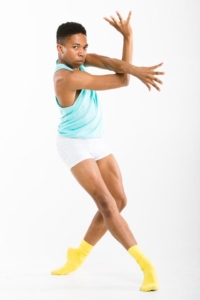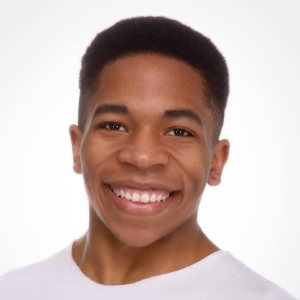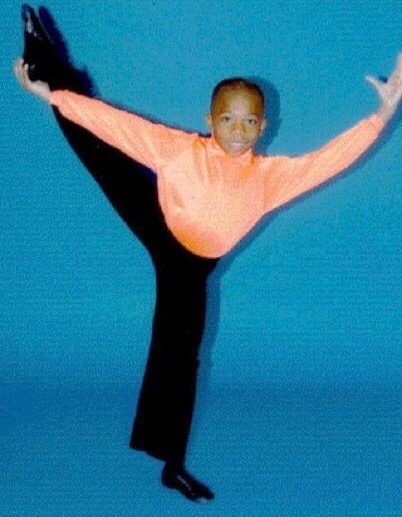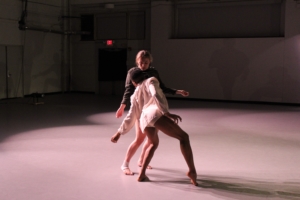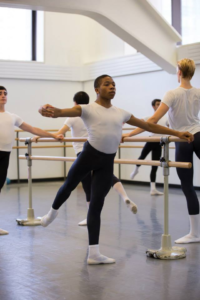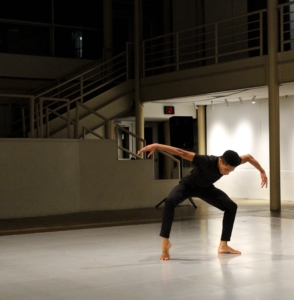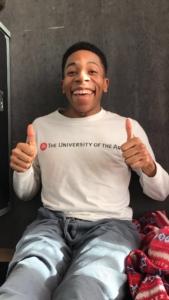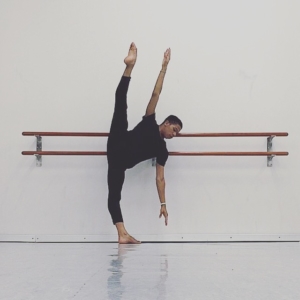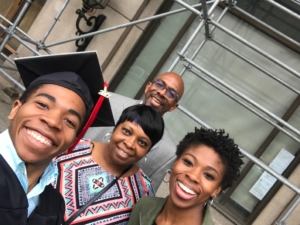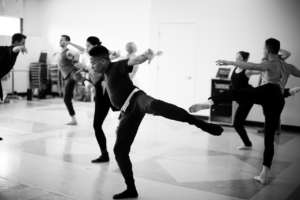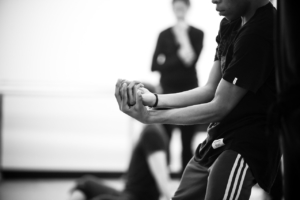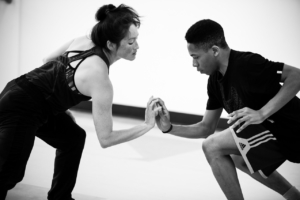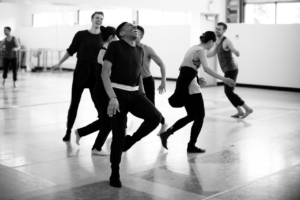If you’re young, romantic and naïve, it may seem that talent, starry-eyed desire and dedication are all you need to become a successful professional dancer. But there’s a lot of luck involved too—being born in the right place to suitable a family and finding your way to good schools and engaged mentors who provide the training and support needed at various stages. And you’ve got to build or summon the internal fortitude to withstand, perhaps even thrive on, fear, harsh criticism, competition, uncertainty, and disappointment. Somehow, instead of feeding resentment, suspicion or bitterness, your trials must help you grow emotionally and nurture your artistry. Each dancer’s life contains a unique and fascinating story of how these elements come together.
At age 5 Cameron Birts hung around the studio where his older sister took tap at Norma’s Academy of Dance in Fairburn, Georgia, always watching. One day he was asked to join in. From that point on, he says, “I never stopped dancing.” He added more classes each year, eventually taking a ballet class, a tap, a jazz, a ‘company’ rehearsal on the weekend and 2 other classes per week. It was every afternoon until 5, an hour on Sunday and a 45 minute drive between home to the studio. Sometimes he fell asleep in the car.
The year he picked up modern dance too was a pivotal point for Cameron. Antonio Sisk, “my first guy teacher,” came to teach part-time time at the studio, becoming his first, and in perhaps his most crucial mentor. Antonio was by all accounts a fine dancer, teacher and friend, who saw that by the time Cameron was in 5th grade, “He has the potential to be a lot better, but he needs to go to a ballet studio.” So Cameron went along to Roswell Dance Theatre, the school where Antonio taught and was offered a full scholarship to train there.
In his new dance school like his old, he was the only boy in most dance classes, “but I learned to deal with that.” Otherwise, the contrasts were striking. The level and kind of dance training was new to Cameron. “Ballet wasn’t as serious and important in my first studio as at Roswell Dance Theater,” he recalls. Classes were 2-½ hours long. He got extra coaching in male technique. And everyone was involved in the shows of Roswell Dance Theater.
But Cameron clearly thrives on challenge and he reveled in the expanded horizons that this new milieu opened up. In the spring of 6th grade, his dance studio participated with many other schools in the national Regional Dance America Festival, held in Pittsburgh that year. Most important, he auditioned for Pittsburgh Ballet Theatre and got a full scholarship to their 5-week Summer Intensive program. “I didn’t perform,” he says, “I was way too young and short, but I went to class and did the audition class.” “The teachers were nice, young and new, but hard on us.” And the big city was intimidating. But when he returned to Pittsburgh the next year, he was older, knew more people and had fun.
After 2 summer sessions in Pittsburgh, a new possibility presented itself: A 4-week Summer Intensive at the HARID Conservatory (Boca Raton, FLA), America’s tuition-free professional training school for gifted young dancers. “HARID,” he says, “was really intense. There were 60 students, and it was hard to get in.” Some ballet classes were taught according to the Vaganova method, others in the French style. “The teachers were very meticulous and detail-oriented. You had to pay attention to the differences—it was kind of scary and hard.” At the end of the summer, Cameron was offered a place in the school. But Cameron’s mother said, “I want you to spend your first high school year at home.”
Another event of that same summer, upended Cameron’s life: the death of his dear friend and coach, Antonio Sisk. Back when Cameron saw him last, at the school recitals in May, Antonio had been “a bit sick, with a cough.” Yet it didn’t seem that serious—after all, he was only 35. Cameron’s parents, “not wanting me to be frazzled” while off in Florida, had not told him his mentor was in the hospital. He died just after Cameron’s return. On first hearing the news, Cameron didn’t cry, he simply couldn’t believe it. “The whole reason I was at the studio where Antonio taught was him.” He was at the center of his dance world. Now that center was gone, with no chance even to say goodbye.
Antonio had been a modern dancer, and Cameron thought, “I can’t do modern dance now.” Back in the studio a week later, he was not in a positive mood. The substitute teacher’s job was unenviable. Says Cameron, “We all only wanted Antonio. This guy wasn’t him. We butted heads.” No one got kicked out, but Cameron and his classmates were always pushing and hassling the new teacher, “which was rough.”
Luckily, two life-savers came into Cameron’s life at this crucial juncture. First, Pebblebrook High School, where he enrolled as a freshman, had a strong arts program. Jazz was taken very seriously, ballet much less so, and he had to work extra hard. “I love really intense work and teachers,” Cameron reports. “Lazy teachers make me lazy. If they don’t care, I don’t. If they have heart and soul, me too.”
And second, Tracy Vogt, another modern dance teacher at Roswell Dance Theatre, became a new mentor for him. She had ties to Antonio Sisk, whom she had met and worked with at PhilDanco in Philadelphia. “It seemed as if she came into my life at this point for a reason,” says Cameron. To prepare him for an American Grande Prix competition in his sophomore year, Tracy choreographed a contemporary variation for him. She gave him private lessons and was harder on him than other students, telling him, “The competition will be tough. You’re not the only boy out there!”
To his amazement. although he was only 15 in the 15-19 age group, he made it through to the finals. Although he didn’t actually compete in the finals, as it was too expensive and would have taken too much time from school, it was a validating experience. So after a rocky beginning, the first 2 years of high school were very good indeed. As Cameron says, “I had found my happy place again.”
At the end of that year, he got a scholarship to Washington Ballet‘s summer program. “It had a reputation as a really tough program. HARID was tough too, but here was a different kind of hard. We were really treated as young trainees. I loved it and how tense it was. I thought, this is where I really need to go. Here is where I have to train.” But again there was that home/career tension. His parents didn’t want him out on his own at that young age and said he had to come back home for his junior year of HS. “From then on things went downhill,” Cameron recalls. As both parents worked in Roswell and the commute was getting hard, they made the decision to move the family there. Cameron and his sister had to switch to a high school in Roswell.
He hated the new school. His friends and life were at Pebblebrook. He found the kids at the Roswell school unfriendly and snobbish. Even his fellow-students from Roswell Dance Theatre already had their own little high school cliques and didn’t act the same toward him there. Nor did he get the classes he wanted. He pleaded with his parents to home school him to no avail. “I was a handful for them,” he says now. “This was rock bottom. It went from happy dream to nightmare.”
Cameron’s only desire now was to finish up high school and get out as fast as possible. It wasn’t all bad, though, since he got a full scholarship for an inspiring summer at the School of American Ballet. Back in Roswell, he tried to decide between college and a professional training program. After researching options—watching videos, checking social media, talking things over with friends at SAB—he fixated on Julliard. The audition process was long, multilayered and incredibly stressful. At each level, his number was called, and he went on to the next round. He told himself to “stay on focus, don’t get over-excited, but don’t get comfortable either. Even in interviews I was scared.” He remained in the running right until 6 got whittled down to 3. But he was not one of those.
Cameron was devastated. It had been so close. After a few days, his teacher Tracy talked with him and said, “You have to go on to what’s next now.” He replied, “I don’t want to go anywhere else with academics. I want to be a dancer—not a dumb dancer, but I don’t just want a regular college.”
That was when she suggested the University of the Arts, Philadelphia, where he could both major seriously in dance and get a good academic background. There were many connections. Tracy had gone there, for one thing, and he loved Philadelphia. But when, after a visit and audition he was told, “You’re in the program,” his parents said, “We can’t afford this. Your sister is in college too.” So he settled down to wait a couple of weeks for the word about scholarships. A mere 3 days later, he got “a random call from Philadelphia. It was the Admissions Office of the University of the Arts.'” The voice on the other end of the line said, “You’ve been awarded the Director’s Scholarship. It’s a full scholarship. You have a week to decide.” Says Cameron, “I hung up the phone and yelled, ‘I got it! Shit! I guess I’m going to college!'”
Cameron pauses in the telling, to add with a grin, “Oh my God, it changed my life so much! The best decision I ever made. I dove right in. I could see I could do so much more than I had realized. The teachers were great and amazing performing opportunities. I couldn’t dream of my life now without it.”
It was a very busy 4 years. Juniors and seniors could audition for works of topnotch visiting choreographers. Auditions were cutthroat and nerve-wracking. Casting decisions were made, and the next day, “You would sew your soul to them for a week.” His last winter and spring, Cameron’s life consisted of back-to-back or overlapping rehearsals,performances, an extremely intense January-February 2017 intensive with Ballet Preljocaj in France, the preparation of a Senior Thesis program. There were also company auditions, including one for Whim W’Him in New York during spring vacation. And at the end of it all, Cameron graduated.
During spring vacation he had also auditioned for Ballet BC, but wasn’t hired. There was not anything from Whim W’Him either. He was beginning to feel burned out. He didn’t want not to be dancing but wasn’t at all sure what the future would hold. Then, he received an email from Whim W’Him director Olivier Wevers asking if he had signed a contract anywhere yet, because there might be one for him.
Cameron was thrilled. The 2-½ week wait seemed way too long. “I wasn’t anxious at night, but thought of it in the day. I kept checking and checking my phone, though I shouldn’t be.”
Perhaps the most notable day of that eventful final college year was April 3, Cameron’s birthday. It was a big week. His Senior Thesis performance was scheduled, lots needed finishing up, and a message arrived on that day from Olivier. Cameron emailed back, “I can talk in 30 minutes.” He was in a small studio waiting with his mentor Michael Sheridan, when Olivier called: “I would like to offer you a contact with Whim W’Him.” Recalls Cameron, “‘Olivier sounded excited, but he sort of thought I didn’t. I said, ‘I’m just kind of tired. Stressed and tired.'” But still he was delighted to accept the offer. “Oh,” added Olivier, “and happy birthday!”
The 2-½ week wait seemed too long. “I wasn’t anxious at night, but thought of it in the day. I kept checking and checking my phone, though I shouldn’t be.”
Perhaps the most notable day of that eventful final college year was April 3, Cameron’s birthday. It was a big week. His Senior Thesis performance was scheduled, all sorts of things needed to be finished up, and a message arrived on that day from Olivier. Cameron emailed back, “I can talk in 30 minutes.” He was in a small studio waiting with his ballet mentor Michael Sheridan, when Olivier’s call came: “I would like to offer you a contact with Whim W’Him.” Recalls Cameron, “‘Olivier sounded excited, but he sort of thought I didn’t. I said, ‘I’m just kind of tired. Stressed and tired.'” But he accepted the offer with delight. “Oh,” added Olivier, “and happy birthday!”
So now Cameron is living in Seattle, making new friends, and becoming part of Whim W’Him. He and newcomer Adrian Hoffman will first perform September 8-16, 2017 at the Erickson Theatre Off Broadway with the company in CHOREOGRAPHIC SHINDIG III.
Photo Credits: Last 4 images by Bamberg Fine Art Photography
